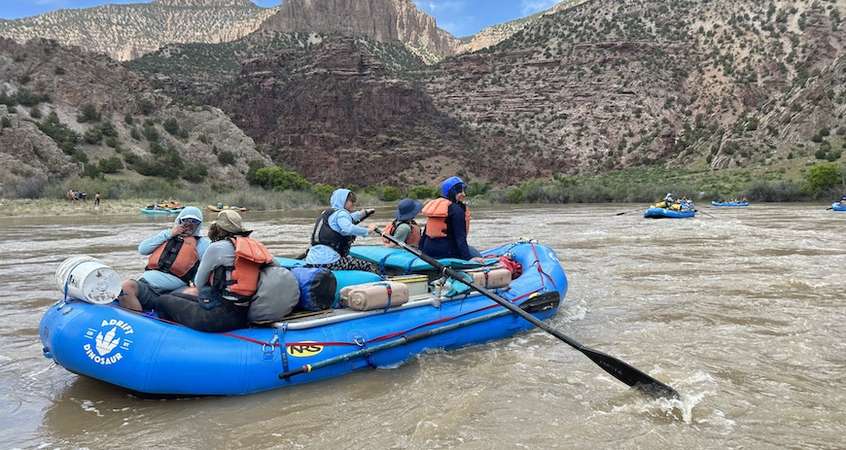
The USDA-funded Secure Water Future (SWF) team at UC Merced believes that to fully understand water, you must do more than just study this vital resource. You must immerse yourself in it - sometimes, literally.
A recent trip to Utah that culminated in rafting The Gates of Lodore on the Green River allowed student participants to both learn about and experience water, in all its forms. This was the second year for this trip, and thanks to this winter's heavy and lengthy snowfall, students got to see the solid form of water, as well.
"We were able to both snowshoe and raft, giving us a really interesting perspective," said Sarah Naumes, managing director of SWF.
Students, who came from UC Merced, UC Davis, UC Berkeley, Utah State University and New Mexico State University, learned from subject experts and mentors who attended parts of the trip. They observed a new irrigation system at a Utah farm. And, of course, they rafted down the Green River for four days. Thirteen graduate students and one undergraduate student intern took part.
"I had a lot of opportunity to learn and talk about my research, which is such good training in scientific communication," said UC Merced student Liying Li. She added that she was surprised by the quality of the trip, as well as "the power of returning to nature and thinking to ourselves, and the inspiration from communicating with mentors and peers of different backgrounds."
UC Davis student Yara Pasner also took part.
"It was a fantastic trip," Pasner said. "I learned a lot about the Green River, the Great Salt Lake, and about Utah agriculture and water management. It was an incredibly diverse group of students, and the programming was educational, inclusive, positive and seamless."
UC Merced postdoctoral fellow Emily Waring was impressed with the variety of topics covered.
"The trip was FULL of activities and bonding," she said. "Everyone learned so much about rivers and also from the participants and mentors, who were from many disciplines."
Waring she said she was surprised to learn how differently water is managed in Utah compared to California.
According to its website, the SWF team's mission is "to understand, enable, and envision water management strategies, empowered through data-enabled decision-making, for agricultural and ecological systems. The transdisciplinary team works with growers, irrigation districts, and ecosystem managers to adopt and adapt climate resilience strategies, train the next generation of transdisciplinary practitioners, and produce an online dashboard for data-driven decision-making."
Events like this Climate Adaptation Science Academy Experiential Learning Expedition (CASA ELE) equip student researchers to meet that mission both through the information provided and the opportunity to connect with other researchers doing similar work. This kind of research can be isolating, and those who joined in the expedition formed relationships with their peers that likely will be long-lasting and fruitful, organizers said.
Li said the trip was well-organized and "created a culture for everyone to support and help each other."
Pasner said she was surprised at how "emotionally intelligent" the experience was.
"The mentors were open to any question, personal or professional," she said. "I was able to ask top-level Utah water administrators and professors how they deal with sexism in the workplace as a woman - and I got real answers. The psychologist on the trip (David Meyer) provided invaluable mentorship on how to allow this trip to fill my emotional battery, and how to spread that sense of peace into the rest of the world. The trip challenged me as a person to use my heart and mind to consider water challenges and solutions with expertise and empathy."
Naumes said the feedback received so far has been overwhelmingly positive.
"Students said they felt reinvigorated, and reconnected with what they are studying."
Pasner echoed that sentiment.
"This trip is a unicorn," she said. "I've come away from this trip with newfound optimism about working in academics. This trip treated us like future leaders. I feel empowered and proud to be part of the Secure Water Future community."
Secure Water Future will host a UC Water Academy on wildfire and water in August for UC graduate students. Next year, CASA ELE will travel to New Mexico.



